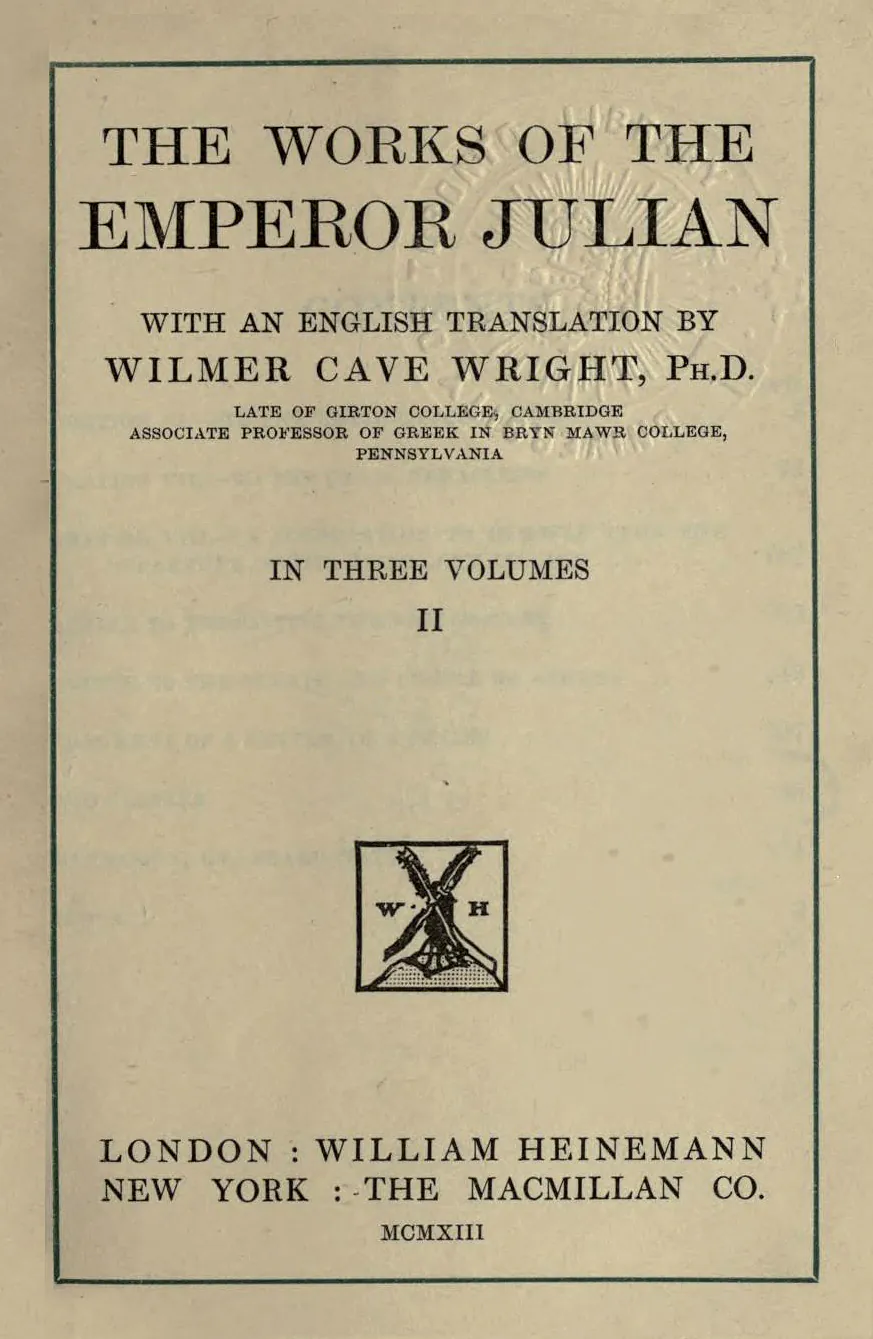[A]
Ψεῦσταί τ ̓ ὀρχησταί τε χοροιτυπίῃσιν ἄριστοι, τοὐναντίον δὲ ἀντ ̓ ἐγκωμίων ὑμῖν προσεῖναί φημι πατρίων ζῆλον ἐπιτηδευμάτων. ἐπεὶ καὶ Ὅμηρος ἐπαινῶν τὸν Αὐτόλυκόν φησι περιεῖναι πάντων
Κλεπτοσύνῃ θ ̓ ὅρκῳ τε.
καὶ ἐμαυτοῦ τὴν σκαιότητα καὶ τὴν ἀμαθίαν καὶ τὴν δυσκολίαν
[B]
καὶ τὸ μὴ ῥᾳδίως μαλάττεσθαι μηδὲ ἐπὶ τοῖς δεομένοις ἢ τοῖς ἐξαπατῶσι τὰ ἐμαυτοῦ ποιεῖσθαι μηδὲ ταῖς βοαῖς εἴκειν καὶ τὰ τοιαῦτα στέργω ὀνείδη. πότερα μὲν οὖν ἐστι κουφότερα, θεοῖς ἴσως δῆλον, ἐπείπερ ἀνθρώπων οὐδεὶς οἷός τε ἡμῖν ἐστιν ὑπὲρ τῶν διαφορῶν βραβεῦσαι· πεισόμεθα γὰρ οὐδαμῶς αὐτῷ διὰ φιλαυτίαν, θαυμάζειν γὰρ εἰκὸς τὰ ἑαυτοῦ ἕκαστον, ἀτιμάζειν δὲ τὰ παρὰ τοῖς ἄλλοις. ὁ δὲ τῷ τὰ ἐναντία ζηλοῦντι νέμων συγγνώμην εἶναί μοι δοκεῖ πρᾳότατος.
[C]
Ἐγὼ δὲ ἐννοήσας εὑρίσκω καὶ ἕτερα δεινὰ ἐμαυτὸν εἰργασμένον. πόλει γὰρ προσιὼν ἐλευθέρᾳ, τὸν αὐχμὸν τῶν τριχῶν οὐκ ἀνεχομένῃ, ὥσπερ οἱ κουρέων ἀποροῦντες ἄκαρτος καὶ βαθυγένειος εἰσέδραμον· ἐνόμισας ἂν Σμικρίνην ὁρᾶν ἢ Θρασυλέοντα, δύσκολον πρεσβύτην ἢ στρατιώτην ἀνόητον, ἐξὸν φανῆναι τῷ καλλωπισμῷ παῖδα ὡραῖον καὶ γενέσθαι μειράκιον, εἰ μὴ τὴν ἡλικίαν, τὸν τρόπον γε
[D]
καὶ τὴν ἁβρότητα τοῦ προσώπου. “Οὐκ οἶσθα ἀνθρώποις ὁμιλεῖν, οὐδ ̓ ἐπαινέτης εἶ τοῦ Θεόγνιδος, οὐδὲ μιμῇ τὸν ἀφομοιούμενον ταῖς πέτραις πολύπουν, ἀλλ ̓ ἡ λεγομένη Μυκόνιος ἀγροικία τε καὶ ἀμαθία καὶ ἀβελτηρία πρὸς πάντας ἐπιτηδεύεται παρὰ σοῦ. λέληθέ σε ὅτι1σε ὅτι—δεῖ Cobet, σε—δεῖν Hertlein, MSS. πολλοῦ δεῖ ταῦτα εἶναι Κελτοὶ καὶ Θρᾷκες καὶ Ἰλλυριοί; οὐχ ὁρᾷς, ὁπόσα μὲν ἐν τῇ πόλει ταύτῃ καπηλεῖα;
[A]
“Liars and dancers, well skilled to dance in a chorus”;2Iliad 24. 261. on the contrary it is in the place of a panegyric that I ascribe to you emulation of the practice of your forefathers. For Homer too is praising Autolycus when he says that he surpassed all men “in stealing and perjury.”3Odyssey 19. 396. And as for my own awkwardness and ignorance and ill-temper,
[B]
and my inability to be influenced, or to mind my own business when people beg me to do so or try to deceive me and that I cannot yield to their clamour – even such reproaches I gladly accept. But whether your ways or mine are more supportable is perhaps clear to the gods, for among men there is no one capable of arbitrating in our disagreement. For such is our self-love that we shall never believe him, since everyone of us naturally admires his own ways and despises those of other men. In fact he who grants indulgence to one whose aims are the opposite of his own is, in my opinion, the most considerate of men.
[C]
But now I come to ponder the matter I find that I have committed yet other terrible sins. For though I was coming to a free city which cannot tolerate unkempt hair, I entered it unshaven and with a long beard, like men who are at a loss for a barber. One would have thought it was some Smicrines4Smicrines is a typical name in New Comedy for an avaricious old man; Thrasyleon is said to have been used by Menander as the name of a boasting soldier, “miles gloriosus.” he saw, or some Thrasyleon, some ill-tempered old man or crazy soldier, when by beautifying myself I might have appeared as a blooming boy and transformed myself into a youth, if not in years,
[D]
at any rate in manners and effeminacy of features. “You do not know,” you answer, “how to mix with people, and you cannot approve of the maxim of Theognis,5Theognis 215 foll. advises men to imitate the adaptability of the polypus. for you do not imitate the polypus which takes on the colours of the rocks. Nay rather you behave to all men with the proverbial Myconian6Mykonos was an island in the Cyclades whose inhabitants were proverbial for poverty and greed. boorishness and ignorance and stupidity. Are you not aware that we here are far from being Celts or Thracians or Illyrians? Do you not see what a number of shops there are in this city?



